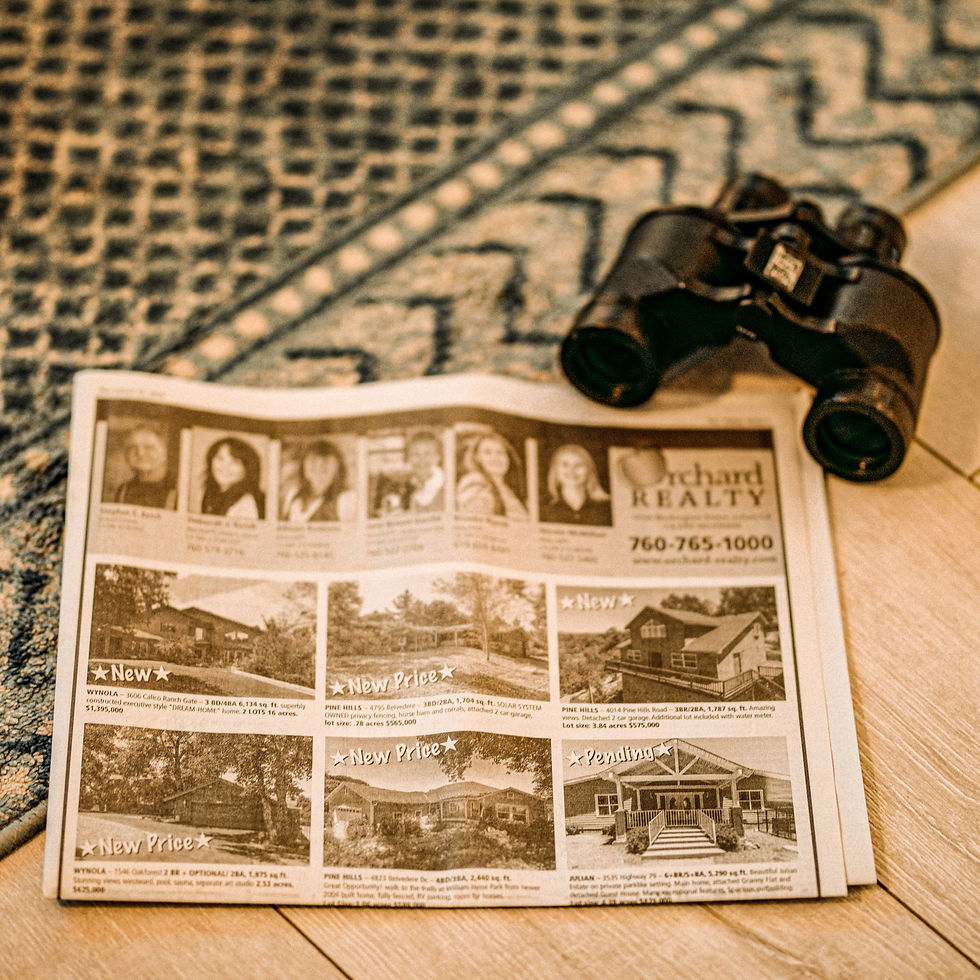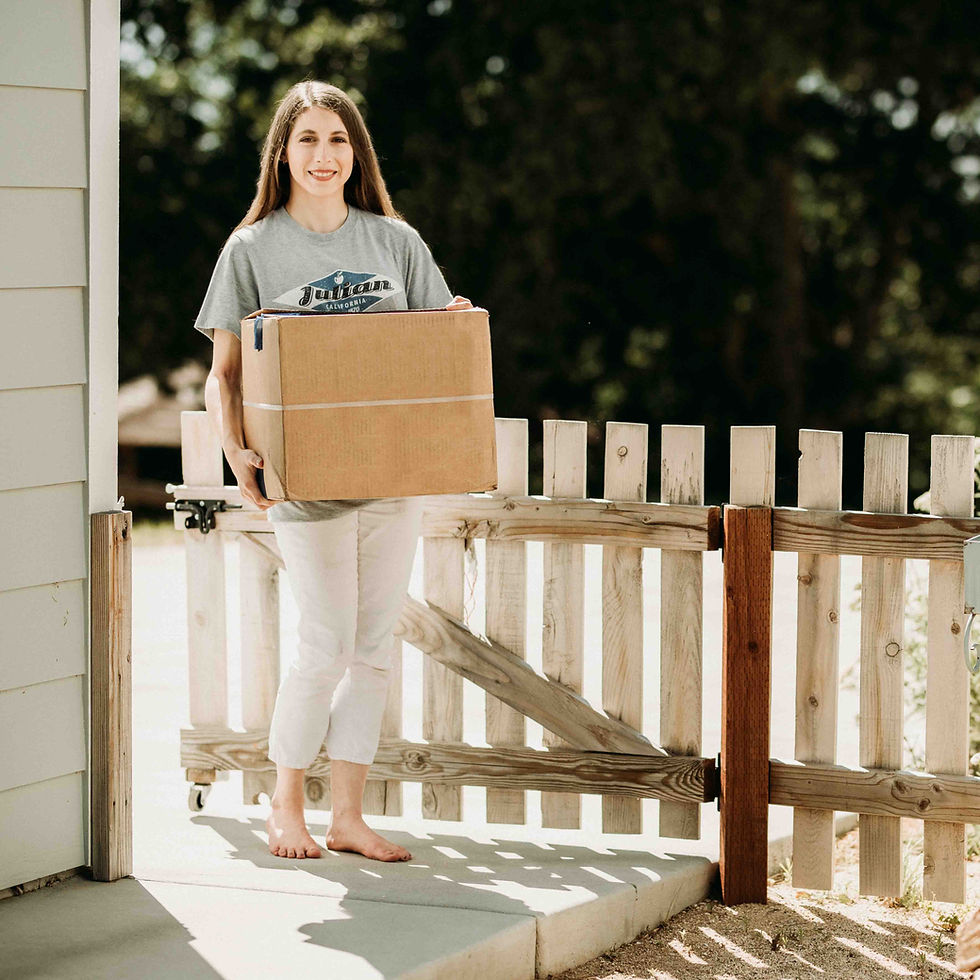House-Hunting Must-Haves Checklist for Country Living
- Eva Hatch

- Dec 23, 2020
- 7 min read
Updated: Mar 10, 2022

Have you ever watched one of those house-hunting shows where the buyers have looked at over 100 houses and just can’t seem to find a house that meets all their requirements? Buying a home in rural areas can be quite a challenge. A majority of the homes are older, making it difficult to find a move-in ready house with the modern touches we have become accustomed to. There are many amazing benefits to living in a rural environment, though, and these will make up for the few downsides.
For those who are house-hunting in the city or suburbs, their lists of must-haves tend to be pretty standard. Modern-day housing developments are designed to check all the boxes on the list. When shopping for a property in small-towns, rural areas, mountains, and the backcountry, though, there are a few things you’ll want to consider in addition to square footage, number of bedrooms, and how many bathrooms there are. There’s no need to worry, because I have your back. Let’s discuss a few additional things you will want to look for when viewing rural homes.
Heat Source
If you live in a four-season climate, you must have a heating source. When looking at a home, consider the primary heat source and the work and costs involved with it. House-hunters often overlook the size of the house. The larger the house, the more it will cost to heat. There are multiple options when it comes to heat sources.
Hallmark does a fantastic job of portraying cozy winter nights by the wood-burning fire. Do not be fooled. There is a lot of work that goes into making those cozy nights a reality. To have a wood-burning fire, you need firewood and lots of it. The wood needs to be seasoned (left out to dry for a long period of time), split, stacked, and stored in a dry place until you are ready to bring it into the house. The amount of wood you will need depends on the efficiency of your fireplace or woodstove and the square footage of the residence. Each year, my family goes through about three cords of wood for a roughly 1,200 square foot home. All the hard work really makes us appreciate a warm house. If you live in a fire-prone area, please do not use your wood-burning fireplace until after the first rain.
A few popular alternative heat sources are propane fireplaces or heaters, pellet stoves, and electric heaters. Using propane to heat your house can really rack up a bill quickly! Electric heaters can also get pretty pricey as a primary source of heat. I have had multiple people tell me that they got tired of lugging around pellets for their pellet stove. I encourage you to look into all heating options to determine what is best for you.
Cell Service and Internet
Outside city limits, cell service and reliable internet coverage is on a case-by-case basis, depending on topography, trees, and exposure. Your neighbor may get a strong signal while another neighbor has marginal service. If these seem random to you, it’s because it is. I strongly recommend not just checking with customer support that your prospective home is within the coverage area, but actually have a technician come to the home. The customer support centers often over-promise, but a technician will be able to tell you what is really possible.
Renters’ and Homeowners’ Insurance
In California, specifically, it is becoming increasingly difficult to obtain fire insurance. It is incredibly important to have it. The San Diego backcountry has a long history of wildfires and in December of 2020, my neighbor lost everything in a house fire. They had no renter insurance. Please get insurance. Many companies are dropping long-time customers. This is leaving residents with no choice but to go through a government insurance provider like California Fair Plan.
Road Conditions and Driveways
In some rural communities, like my hometown of Julian, road maintenance is a mix of government and private efforts. If you are looking at a home on a private road, road repairs are an additional cost to add to your budget. Also, when house-hunting in higher elevations, snow plowing may be an additional expense. Pro tip: If you live on a road that is not plowed, make sure there is a place to park your vehicle at the end of the road so you can get out easier. I also recommend avoiding homes with long, steep driveways.
Here is some information on preparing for winter and how to drive in the snow.
Paper Roads
Never heard of paper roads? It’s a country thing. In wanky little towns, gride planning was optional. Just imagine your kid scribbling on a piece of paper. Yeah, that’s what Julian looks like on a map. Paper roads are planned out on paper, but the road was never actually constructed on the easement. We have one on our property. The chances of paper roads being built out are slim to none; however, while the easement is still government-owned, you may not be able to develop the easement land. Check for road easements before you develop the land.
HOAs
Just like with everything else, homeowners’ associations might be a little different than those in the city. For example, in my hometown, there are very few neighborhoods with covenants, conditions, and restrictions (CC&Rs). Of those neighborhoods, the CC&Rs are tied to a sitting board with multiple functions as a water district. Additionally, part of my community is within a historic district that has its own set of rules that must be followed. It’s wanky, I know.
Zoning
Dreaming of a little piece of land in the country where you can just be free to do as you please? Think again. I don’t mean to be a Debbie Downer, I just don’t want you to be caught off guard after the sale is final. Just because you are outside city limits doesn’t mean there are no zoning rules. If you want to have a business on the property, make sure the property is zoned for commercial or agricultural use. If you want to build a home, make sure the property is buildable. I also recommend looking into permit fees, building code requirements, and other restrictions like dark-sky zones. The government is really good at racking up a bill for you. If you want to camp on your empty lot, think again, because that might not be legal. Crazy, I know.
Land
Having a good-size piece of land to call yours is freedom from our modern-day, cramped apartment lifestyle. With that land comes work. In the spring, you will need to weed-whack it multiple times. In the fall, you will be raking and bagging the leaves. After there is snow, you will be digging your car out and plowing your driveway. Not to mention, you will be constantly clearing brush, trimming trees, and maintaining the land. Coming from someone who grew up on an acre of land, we do all of this on top of any other improvements needed. Just be prepared to do this work yourself or to pay someone to do it.
Registered Sex Offender
In the State of California, convicted sex offenders must publicly register their primary residence. After serving their time, sex offenders often relocate to rural areas because it is easier to find a residence within their restrictions. I used to think Julian had a high percentage until I searched other San Diego neighborhoods on the registry. My advice to you when moving to a new area is to check who lives where. I have not heard of an issue with any of the registered sex offenders in my community. I have actually found that those who are not on the list were problem-makers. Still, this is one area where you can never be too cautious. I am always surprised at how many people aren’t aware of who they should be conscious of, myself included. A past friend lived with a family member who was a registered sex offender, and I was unaware of it for a time. This being said from a young age I have ALWAYS felt very safe in my community. In small towns, we watch out for each other. Unfortunately, this is a fact of life we need to be aware of. I do want to give a shout out to local law enforcement for being on top of safety issues like this one.
Get The Best Bang For Your Buck
Historically homes in the San Diego Backcountry have been on the smaller size. This is slowly changing as the community has rebuilt from the wildfires and the vacant plots are being delivered. Depending on the real estate market, house hunters can get a better deal the larger the home is. For example homes under 1,500 square feet usually sell between $100,000 and 500,000 depending on how hot the market is. A home that is 2,000 and up typically sells between $700,000 and a $1,000,000. Being that the rural communities are mainly lower and middle-class families large homes typically don't sell as well so house hunters can get a better bang for their buck when buying a larger home.
Property Boundaries
Similar to how the streets were planned, property boundaries are also casual, meaning that a lot of property owners have estimated property boundaries. For example, part of my neighbors’ house was built on someone else’s property. As we say, “Oops! It’s Julian.” Now this is an extreme case, so don’t freak out too much. Most of the property boundary issues have been solved as the community has rebuilt from the Cedar Fire. Nevertheless, I do recommend having the property surveyed during escrow.
Homes on Ridges
Living in the mountains means that some homes have stunning views. Just be aware, homes located on ridges often experience high winds during the fall and winter months.
In Conclusion
Lastly, as you acclimate to your new community, please get involved. Small towns depend on their community member to keep things afloat. When community members leave, their residence isn't the only gap to be filled. The community organizations they partied in also lost a member(s). I ask that no matter what new community you move to, that you please get involved in local organizations. The long term survival of the community depends on it.
The items I mention above aren’t meant to be deal-breakers. These are things that most first-time homeowners don’t think to consider before purchasing or renting a rural home. They may be temporary inconveniences until you get accustomed to the lifestyle changes you may need to make. Look, if my family of six has managed to survive with only one bathroom for twenty-three years, you can manage too. Here’s to all of us living old-fashioned on purpose!




Comments